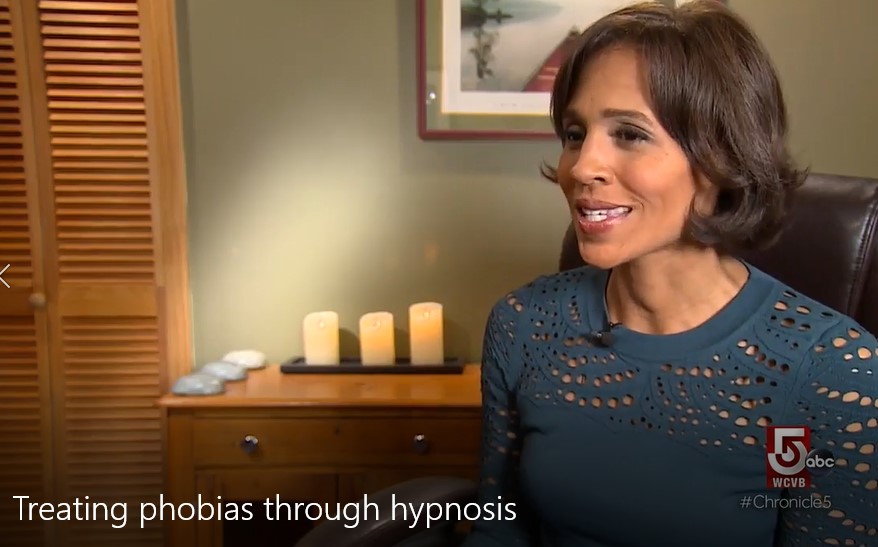
 Hypnosis is perhaps one of the least understood therapeutic tools in use. While most people think of hypnosis as a way to get somebody to bark like a dog at the snap of your fingers or take off their clothes when you say the work ‘stupendous’, hypnosis can be a valuable tool in helping people overcome fears, withstand pain, or improve their ability to manage stress in their lives.
Hypnosis is perhaps one of the least understood therapeutic tools in use. While most people think of hypnosis as a way to get somebody to bark like a dog at the snap of your fingers or take off their clothes when you say the work ‘stupendous’, hypnosis can be a valuable tool in helping people overcome fears, withstand pain, or improve their ability to manage stress in their lives.
Contrary to popular belief, nobody can hypnotize you without your consent or awareness. You can, however, be hypnotized by a trained professional whom you trust, to more easily achieve goals you set for yourself. Even better, you can save time and money and learn to hypnotize yourself using your own voice or even just your thoughts, a practice known as self-hypnosis.
How It Works
Hypnosis can be used for stress management in two ways. First, you can use hypnosis to get into a deeply relaxed state, fighting tension and triggering your relaxation response. This will help to prevent health problems due to chronic stress. Next, hypnosis can also help you achieve various healthy lifestyle changes that can reduce the amount of stress you encounter in your life.
For example, you can hypnotize yourself to stick to an exercise program, keep your home less cluttered, feel more confident setting boundaries with others, etc.
You can use hypnosis to reduce the level of anxiety you feel when you encounter situations that normally trigger stress as well, such as intimidating social situations. In this same vein, you can also effectively use hypnosis to help overcome any negative habits you’ve been using to cope with stress, like smoking or compulsive eating.
What’s involved
The process of hypnosis involves entering a trance, or a deeply relaxed, but focused state (like that of daydreaming or meditation), and making suggestions for your subconscious mind to accept.
You can go to a trained professional for hypnotherapy, and they will talk you through it. Or, you can employ the use of books, videos, or even short articles to learn what’s involved, and achieve effective results at home.
Benefits
Hypnosis is an extremely versatile tool that can be used for everything from simple relaxation to pain management in childbirth. It’s easy to do, can be quite inexpensive, and the results are lasting.
There are almost no potential negative side effects, and it can give multiple benefits at the same time. Rarely, upsetting information can come up from your subconscious mind and can be discussed and processed in therapy. Also, it is important to remember that
Drawbacks
Hypnosis isn’t for everyone. Some people have trouble getting past their initial prejudices about the practice in general, and some have a more difficult time getting into the trance-like state required for hypnotic suggestions to become deeply embedded. Others find that they simply can’t find the time or the focus, and have an easier time with other stress-management techniques.
 How Self-Hypnosis Compares to Other Stress Reduction Methods
How Self-Hypnosis Compares to Other Stress Reduction Methods
Like meditation, hypnosis does require more focus and practice than techniques like simple exercise or the use of medications and herbal treatments, and hypnosis also requires some training or the help of a trained professional.
However, hypnosis may be a preferable option for those with physical limitations that make exercise like yoga more difficult. There are few (if any) potential negative side effects, like with some medications or herbal remedies. Also, few other techniques can offer such a wide variety of benefits.
With training and practice, virtually anyone can use hypnosis to some degree of success and experience the many benefits this technique has to offer. This is an often-overlooked but wonderfully effective route to stress relief.
By: Elizabeth Scott

 Irritable bowel syndrome is a chronic condition that affects many people across the world. Due to symptoms such as abdominal pain, this disorder can have a big impact on life quality. New research, however, reveals that hypnotherapy can improve life for those with the condition.
Irritable bowel syndrome is a chronic condition that affects many people across the world. Due to symptoms such as abdominal pain, this disorder can have a big impact on life quality. New research, however, reveals that hypnotherapy can improve life for those with the condition.
Can hypnotherapy truly relieve IBS symptoms?
People with irritable bowel syndrome (IBS) can experience symptoms such as abdominal pain and abnormal bowel movements to various degrees of severity, and they can also face mental health problems, including anxiety and depression.
Some common approaches to managing IBS are by carefully controlling one’s diet, improving one’s lifestyle choices, and, if necessary, seeking mental health therapy.
In the past, some research has suggested that people with IBS may also benefit from hypnotherapy sessions. Now, specialists at the University Medical Center Utrecht and other institutions in the Netherlands have decided to delve deeper into the question of whether hypnotherapy can improve IBS symptoms — and if so, in what way. The researchers recently conducted a randomized controlled trial, the findings of which now appear in The Lancet Gastroenterology & Hepatology.
Improved symptom relief
The study assessed the efficacy of individual and group hypnotherapy in IBS. It is the largest study to date to look into this issue.
In the study, the researchers worked with 354 participants aged 18–65 with IBS.
The scientists randomly selected participants to take part in one of three interventions:
– individual 45 minute hypnotherapy sessions twice per week for 6 weeks (150 participants)
– group hypnotherapy sessions with the same timeframe (150 participants)
– dedicated educational supportive care sessions (54 participants)
For the delivery of the hypnotherapy sessions, the team recruited psychologists who had trained in hypnotherapy. During the sessions, the hypnotherapists applied techniques of positive visualization, providing suggestions about pain and discomfort management.
They also gave the participants CDs containing materials that would allow them to practice hypnosis techniques on their own for 15–20 minutes on a daily basis.
The researchers asked the participants to fill in questionnaires assessing various factors relevant to the study — including the severity of their IBS symptoms, their quality of life, how much they spent on healthcare, and how often they had to miss work due to the condition.
The assessments took place at baseline, at the 3-month mark, and at the 9-month mark. The team also evaluated to what extent participants experienced relief immediately after the intervention (at the 3-month mark) and then again 9 months later.
The scientists found that the people with IBS who had participated in hypnotherapy — whether individual or group-based — experienced the most satisfactory degree of symptom relief, compared with participants in the educational supportive care group.
Participants who underwent hypnotherapy were still enjoying the benefits 9 months after the treatment. However, the researchers claim that despite reporting satisfactory rates of symptom relief, the participants did not actually see a significant improvement in symptom severity as such.
“We do not know exactly how gut-directed hypnotherapy works,” says lead researcher Dr. Carla Flik, “but it may change patients’ mindset and internal coping mechanisms, enabling them to increase their control over autonomic body processes, such as how they process pain and modulate gut activity.”
 Group sessions just as promising
Group sessions just as promising
Other than symptom relief, the tested-for factors — including quality of life, psychological problems, healthcare costs, and work absence — remained roughly the same among all the participants following the interventions.
The researchers also admit that their study faced a few limitations. For example, some participants — 22 (15 percent) of those in the individual hypnotherapy group, another 22 (15 percent) of those in the group hypnotherapy sessions, and 11 (20 percent) of those in the educational supportive care group — dropped out of the study.
Also, a significant number of participants did not manage to fill in all the questionnaires, which, the researchers say, may have impacted the findings. However, the researchers note that the results they recorded in the recent study may, in fact, have been an underestimation, since the hypnotherapists did not have previous experience in treating people with IBS, specifically. Also, the participants only received six hypnotherapy sessions, which is only half the number of sessions that a person would normally expect to receive.
“Our study indicates that hypnotherapy could be considered as a treatment option for patients with IBS, irrespective of symptom severity and IBS sub-type. It is also promising to see that group hypnotherapy is as effective as individual sessions, which may mean that more people could be treated with it at lower cost, should it be confirmed in further studies.”
“What’s striking about these findings is the extent to which patients’ perception of their illness has an effect on their suffering, and that their perception of symptoms appears to be as important as actual symptom severity,” adds Dr. Flik.
By: Maria Cohut
 According to thousands of years of tradition, Buddhists meditate to understand themselves and their connections to all beings. By doing so, they hope to be released from suffering and ultimately gain enlightenment.
According to thousands of years of tradition, Buddhists meditate to understand themselves and their connections to all beings. By doing so, they hope to be released from suffering and ultimately gain enlightenment.
In recent decades, researchers have been gaining insight into the benefits of practicing this ancient tradition. By studying more secular versions of mindfulness meditation, they’ve found that learning to pay attention to our current experiences and accept them without judgment might indeed help us to be happier.
Studies to date suggest that mindfulness affects many aspects of our psychological well-being—improving our mood, increasing positive emotions, and decreasing our anxiety, emotional reactivity, and job burnout.
Recently, researchers have been exploring this question—with some surprising results. While much of the early research on mindfulness relied on pilot studies with biased measures or limited groups of participants, more recent studies have been using less-biased physiological markers and randomly controlled experiments to get at the answer. Taken together, the studies suggest that mindfulness may impact our hearts, brains, immune systems, and more.
Though nothing suggests mindfulness is a standalone treatment for disease nor the most important ingredient for a healthy life, here are some of the ways that it appears to benefit us physically.
Mindfulness is good for our hearts
Heart disease is the leading killer in the United States, accounting for about 1 in 4 deaths every year. So, whatever decreases the risks or symptoms of heart disease would significantly impact society’s health. Mindfulness may help with that.
In one study, people with pre-hypertension were randomly assigned to augment their drug treatment with either a course in mindfulness meditation or a program that taught progressive muscle relaxation.
Those who learned mindfulness had significantly greater reductions in their systolic and diastolic blood pressure than those who learned progressive muscle relaxation, suggesting that mindfulness could help people  at risk for heart disease by bringing blood pressure down.
at risk for heart disease by bringing blood pressure down.
In another study, people with heart disease were randomly assigned to either an online program to help them practice meditation or to a wait list for the program while undergoing normal treatment for heart disease. Those who took the mindfulness program showed significant improvements on the six-minute walking test (a measure of cardiovascular capacity) and slower heart rates than those in the wait list group.
While one review of randomly controlled studies showed that mindfulness may have mixed effects on the physical symptoms of heart disease, a more recent review published by the American Heart Association concluded that, while research remains preliminary, there is enough evidence to suggest mindfulness as an adjunct treatment for coronary disease and its prevention.
Mindfulness may also be good for hearts that are already relatively healthy. Research suggests that meditating can increase respiratory sinus arrhythmia, the natural variations in heart rate that happen when we breathe that indicate better heart health and an increased chance of surviving a heart attack.
Mindfulness may decrease cognitive decline from aging or Alzheimer’s
People tend to lose some of their cognitive flexibility and short-term memory as they age. But mindfulness may be able to slow cognitive decline, even in people with Alzheimer’s disease. In a 2016 study, people with Alzheimer’s disease engaged in either mindfulness meditation, cognitive stimulation therapy, relaxation training, or no treatment, and were given cognitive tests over two years.
While cognitive stimulation and relaxation training seemed to be somewhat beneficial in comparison to no treatment, the mindfulness training group had much more robust improvements on cognitive scores than any other group.
Why might that be true? A 2017 study looking at brain function in healthy, older adults suggests meditation may increase attention. In this study, people 55 to 75 years old spent eight weeks practicing either focused breathing meditation or a control activity.
 Then, they were given the Stroop test—a test that measures attention and emotional control—while having their brains monitored by electroencephalography.
Then, they were given the Stroop test—a test that measures attention and emotional control—while having their brains monitored by electroencephalography.
Those undergoing breath training had significantly better attention on the Stroop test and more activation in an area of the brain associated with attention than those in the active control group.
While this research is preliminary, a systematic review of research to date suggests that mindfulness may mitigate cognitive decline, perhaps due to its effects on memory, attention, processing, and executive functioning.
Mindfulness may improve your immune response
When we encounter viruses and other disease-causing organisms, our bodies send out troops of immune cells that circulate in the blood. These cells, including pro- and anti-inflammatory proteins, neutrophils, T-cells,immunoglobulins, and natural killer cells, help us to fight disease and infection in various ways. Mindfulness, it turns out, may affect these disease-fighting cells.
In several studies, mindfulness meditation appeared to increase levels of T-cells or T-cell activity in patients with HIV or breast cancer. This suggests that mindfulness could play a role in fighting cancer and other diseases that call upon immune cells. Indeed, in people suffering from cancer, mindfulness appears to improve a variety of biomarkers that might indicate progression of the disease.
In another study, elderly participants were randomly assigned to an eight-week Mindfulness-Based Stress Reduction (MBSR) course or a moderate-intensity exercise program. At the end, participants who’d practiced mindfulness had higher levels of the protein interleukin-8 in their nasal secretions, suggesting improved immune function.
Another study found increases in interleukin-10 in colitis patients who took a mindfulness meditation course compared to a mind-body educational program, especially among patients whose colitis had flared up. Yet another study found that patients who had greater increases in mindfulness after an MBSR course also showed faster wound healing, a process regulated by the immune system.
Studies have found effects on markers of inflammation, too—like C-reactive protein, which in higher levels can harm physical health. Research shows that people with rheumatoid arthritis have reduced C-reactive protein levels after taking an MBSR course versus being on a waitlist for the course. Overall, these findings suggest that mindfulness meditation can have disease-fighting powers through our immune response.
Mindfulness may reduce cell aging
Cell aging occurs naturally as cells repeatedly divide over the lifespan and can also be increased by disease or stress. Proteins called telomeres, which are found at the end of chromosomes and serve to protect them from aging, seem to be impacted by mindfulness meditation.
 Studies suggest that long-time meditators may have greater telomere lengths. In one experimental study, researchers found that breast cancer survivors who went through MBSR preserved the length of their telomeres better than those who were on a wait list.
Studies suggest that long-time meditators may have greater telomere lengths. In one experimental study, researchers found that breast cancer survivors who went through MBSR preserved the length of their telomeres better than those who were on a wait list.
However, this study also found that general supportive therapies impacted telomere length; so, there may not be something special about MBSR that impacts cell aging. On the other hand, another study with breast cancer survivors found no differences in telomere length after taking an MBSR course; but they did find differences in telomere activity, which is also related to cell aging.
In fact, a 2018 review of research ties mindfulness training to increased telomere activity, suggesting it indirectly affects the integrity of the telomeres in our cells. Perhaps that’s why scientists are at least optimistic about the positive effects of meditation on aging.
Mindfulness may help reduce psychological pain
Of course, while the above physiological benefits of mindfulness are compelling, we needn’t forget that mindfulness also impacts our psychological well-being, which, in turn, affects physical health. In fact, it’s quite likely that these changes have synergistic effects on one another.
First of all, a great deal of research suggests that mindfulness can help healthy people reduce their stress. And thanks to Jon-Kabat Zinn’s pioneering MBSR program, there’s now a large body of research showing that mindfulness can help people cope with the pain, anxiety, depression, and stress that might accompany illness, especially chronic conditions.
For example, drug addictions, at heart, come about because of physiological cravings for a substance that relieves people temporarily from their psychological suffering. Mindfulness can be a useful adjunct to addiction treatment by helping people better understand and tolerate their cravings, potentially helping them to avoid relapse after they’ve been safely weaned off of drugs or alcohol. The same is true for people struggling with overeating.
Fascinating though it is, we shouldn’t overplay meditation’s effects on physical health at the expense of its importance to emotional health. In fact, it may be difficult to separate out the two, as a key impact of mindfulness is stress reduction, and psychological stress has been tied to heart health, immune response, and telomere length.
This idea is further supported by the fact that other stress-reducing therapies also seem to impact physical health, as well. Still, it’s encouraging to know that something that can be taught and practiced can have an impact on our overall health—not just mental but also physical—more than 2,000 years after it was developed. That’s reason enough to give mindfulness meditation a try.
By: Jill Suttie

 Hypnosis is perhaps one of the least understood therapeutic tools in use. While most people think of hypnosis as a way to get somebody to bark like a dog at the snap of your fingers or take off their clothes when you say the work ‘stupendous’, hypnosis can be a valuable tool in helping people overcome fears, withstand pain, or improve their ability to manage stress in their lives.
Hypnosis is perhaps one of the least understood therapeutic tools in use. While most people think of hypnosis as a way to get somebody to bark like a dog at the snap of your fingers or take off their clothes when you say the work ‘stupendous’, hypnosis can be a valuable tool in helping people overcome fears, withstand pain, or improve their ability to manage stress in their lives.
 How Self-Hypnosis Compares to Other Stress Reduction Methods
How Self-Hypnosis Compares to Other Stress Reduction Methods
 Irritable bowel syndrome is a chronic condition that affects many people across the world. Due to symptoms such as abdominal pain, this disorder can have a big impact on life quality. New research, however, reveals that hypnotherapy can improve life for those with the condition.
Irritable bowel syndrome is a chronic condition that affects many people across the world. Due to symptoms such as abdominal pain, this disorder can have a big impact on life quality. New research, however, reveals that hypnotherapy can improve life for those with the condition. Group sessions just as promising
Group sessions just as promising
 According to thousands of years of tradition, Buddhists meditate to understand themselves and their connections to all beings. By doing so, they hope to be released from suffering and ultimately gain enlightenment.
According to thousands of years of tradition, Buddhists meditate to understand themselves and their connections to all beings. By doing so, they hope to be released from suffering and ultimately gain enlightenment. at risk for heart disease by bringing blood pressure down.
at risk for heart disease by bringing blood pressure down. Then, they were given the Stroop test—a test that measures attention and emotional control—while having their brains monitored by electroencephalography.
Then, they were given the Stroop test—a test that measures attention and emotional control—while having their brains monitored by electroencephalography. Studies suggest that long-time meditators may have greater telomere lengths. In one experimental study, researchers found that breast cancer survivors who went through MBSR preserved the length of their telomeres better than those who were on a wait list.
Studies suggest that long-time meditators may have greater telomere lengths. In one experimental study, researchers found that breast cancer survivors who went through MBSR preserved the length of their telomeres better than those who were on a wait list.








